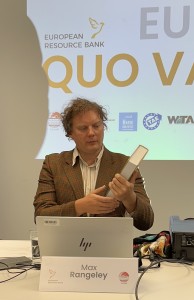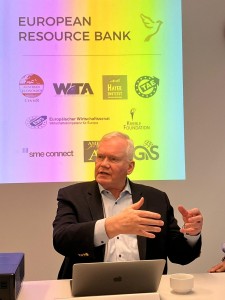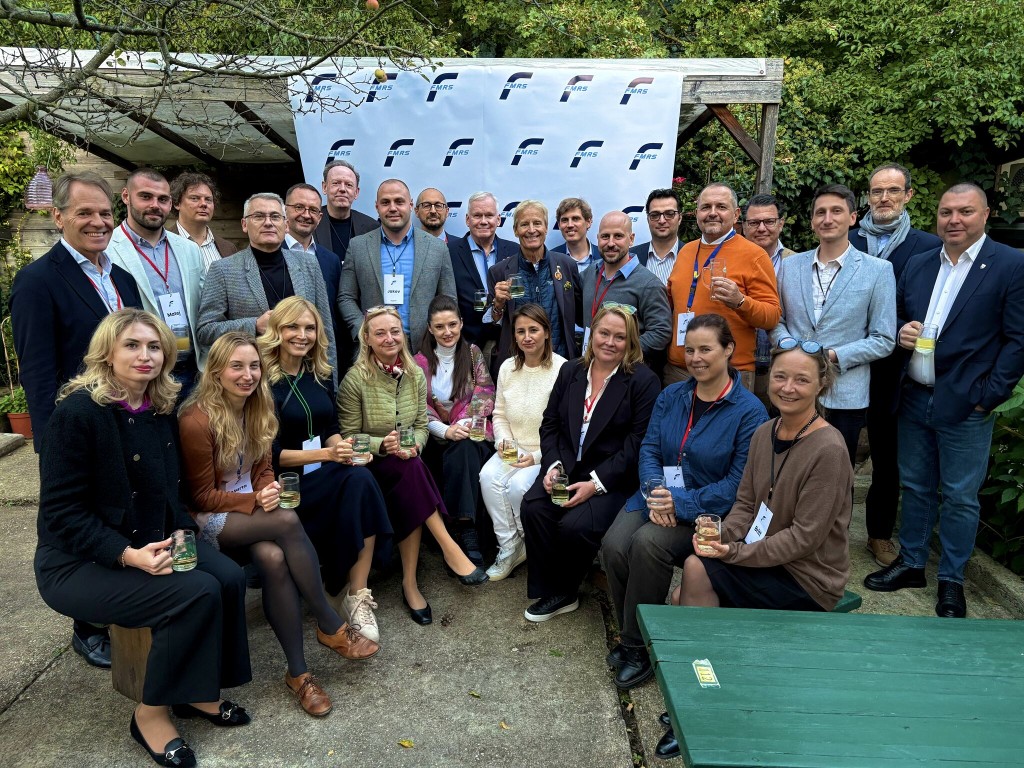 At the European Resource Bank in Vienna on 2 October 2025, economist and entrepreneur Max Rangeley presented the book that he has co-edited with Lord Daniel Hannan, Free Trade in the Twenty-First Century, recently published by Springer Nature. The contributors include Nobel Laureate Vernon Smith, former prime ministers of the United Kingdom and of Australia Liz Truss and Tony Abbot, veteran liberal economists Eamonn Butler, Walter E. Block and Richard M. Ebeling, Lords (and former British government ministers) Peter Lilley and Syed Kamall, renowned economic historian Deirdre McCloskey (President of the Mont Pelerin Society), and RNH Academic Director, Professor Emeritus Hannes H. Gissurarson, who writes about free trade in the Nordic countries. ‘We hope, in the essays that follow, not only to set out the definitive case for free trade in the twenty-first century but also to recapture some of the moral fervour of its original advocates, the sense that they were engaged in a great and just cause,’ the editors write in their Preface. ‘To economists, the benefits of specialisation and comparative advantage are so obvious as to be uncontroversial. Free trade is one of the very few precepts that can be said to command general acceptance within their profession.’ Nevertheless, protectionism is on the rise. The case for free trade has to be restated, the editors say.
At the European Resource Bank in Vienna on 2 October 2025, economist and entrepreneur Max Rangeley presented the book that he has co-edited with Lord Daniel Hannan, Free Trade in the Twenty-First Century, recently published by Springer Nature. The contributors include Nobel Laureate Vernon Smith, former prime ministers of the United Kingdom and of Australia Liz Truss and Tony Abbot, veteran liberal economists Eamonn Butler, Walter E. Block and Richard M. Ebeling, Lords (and former British government ministers) Peter Lilley and Syed Kamall, renowned economic historian Deirdre McCloskey (President of the Mont Pelerin Society), and RNH Academic Director, Professor Emeritus Hannes H. Gissurarson, who writes about free trade in the Nordic countries. ‘We hope, in the essays that follow, not only to set out the definitive case for free trade in the twenty-first century but also to recapture some of the moral fervour of its original advocates, the sense that they were engaged in a great and just cause,’ the editors write in their Preface. ‘To economists, the benefits of specialisation and comparative advantage are so obvious as to be uncontroversial. Free trade is one of the very few precepts that can be said to command general acceptance within their profession.’ Nevertheless, protectionism is on the rise. The case for free trade has to be restated, the editors say.
 In his talk at the European Resource Bank, Professor Gissurarson observed a seismic shift in European politics. On the left, Gramsci had replaced Lenin as the prophet. The Left had established hegemony in the universities, in the media and in public institutions, even the courts. But it might destroy itself by its absurd wokeism and cancel culture, rejected by all normal people, according to Gissurarson. On the right, the traditional conservative-liberal parties had not realised that the free movement of capital, goods, services, and people (the celebrated ‘four freedoms’) could not include the free movement across borders of criminal gangs, religious zealots (in particular Muslim extremists) and people in search solely of welfare benefits. Gissurarson quoted Friedrich A. von Hayek in The Times on 11 October 1978: ‘While I look forward, as an ultimate ideal, to a state of affairs in which national boundaries have ceased to be obstacles to the free movement of men,’ he declared, ‘I believe that within any period with which we can now be concerned, any attempt to realize it would lead to a revival of strong nationalist sentiments.’
In his talk at the European Resource Bank, Professor Gissurarson observed a seismic shift in European politics. On the left, Gramsci had replaced Lenin as the prophet. The Left had established hegemony in the universities, in the media and in public institutions, even the courts. But it might destroy itself by its absurd wokeism and cancel culture, rejected by all normal people, according to Gissurarson. On the right, the traditional conservative-liberal parties had not realised that the free movement of capital, goods, services, and people (the celebrated ‘four freedoms’) could not include the free movement across borders of criminal gangs, religious zealots (in particular Muslim extremists) and people in search solely of welfare benefits. Gissurarson quoted Friedrich A. von Hayek in The Times on 11 October 1978: ‘While I look forward, as an ultimate ideal, to a state of affairs in which national boundaries have ceased to be obstacles to the free movement of men,’ he declared, ‘I believe that within any period with which we can now be concerned, any attempt to realize it would lead to a revival of strong nationalist sentiments.’
Hayek was certainly prescient, Gissurarson submitted. In Great Britain, Germany, and France, according to the polls, anti-immigration parties are now larger than the traditional centre-right parties. The important task is, Gissurarson said, to direct these strong nationalist sentiments into liberal rather than authoritarian channels, and it could be done by keeping borders open for hard-working, honest, law-obedient, productive immigrants, while resolutely closing the borders to criminal gangs, religious zealots and idle welfare seekers, who should either not be allowed in or deported immediately when found out. Free trade should not be sacrificed on the altar of unrestricted immigration. Other speakers included Dr. Barbara Kolm, Director of the Austrian Economics Center in Vienna, Pieter Cleppe, Editor-in-Chief of BrusselsReport.eu, and Professor Christopher Lingle who celebrated his 77th birthday on the same day, 2 October 2025, standing in the middle in the group photograph below, with Gissurarson on his right and Cleppe on his left.



